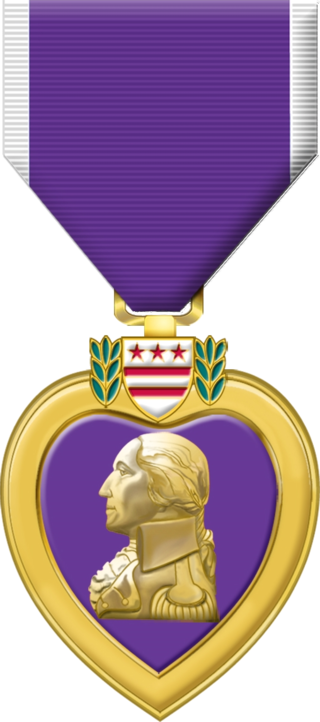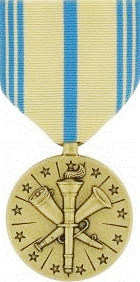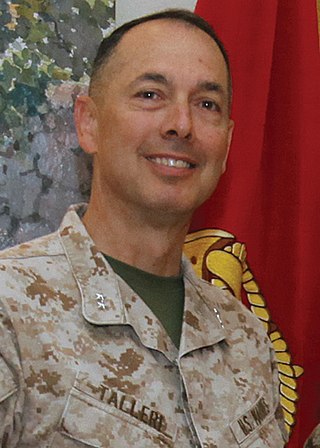
The Purple Heart (PH) is a United States military decoration awarded in the name of the president to those wounded or killed while serving, on or after 5 April 1917, with the U.S. military. With its forerunner, the Badge of Military Merit, which took the form of a heart made of purple cloth, the Purple Heart is the oldest military award still given to U.S. military members. The National Purple Heart Hall of Honor is located in New Windsor, New York.
The National Defense Service Medal (NDSM) was a service award of the United States Armed Forces established by President Dwight D. Eisenhower in 1953. It was awarded to every member of the U.S. Armed Forces who served during any one of four specified periods of armed conflict or national emergency from June 27, 1950 through December 31, 2022. Combat or "in theater" service is not a requirement for the award.
A "V" device is a metal 1⁄4-inch (6.4 mm) capital letter "V" with serifs which, when worn on certain decorations awarded by the United States Armed Forces, distinguishes a decoration awarded for combat valor or heroism from the same decoration being awarded for a member's actions under circumstances other than combat.

The Armed Forces Reserve Medal (AFRM) is a service medal of the United States Armed Forces that has existed since 1958. The medal recognizes service performed by members of the reserve components and is awarded to both officers and enlisted personnel. The medal is considered a successor award to the Naval Reserve Medal and the Marine Corps Reserve Ribbon, which were discontinued in 1958 and 1965, respectively.

George Brainard Crist was a four-star general of the United States Marine Corps and was the first Marine to be designated as a Unified Commander, serving as Commander in Chief of the United States Central Command from 1985 to 1988.

The Republic of Vietnam Civil Actions Medal also known as the Vietnam Civil Actions Medal or Civil Actions Medal, is a military decoration of the former South Vietnamese government (1955–75). The medal was created on May 12, 1964 during the Vietnam War. The Civil Actions Medal was awarded to the South Vietnamese military and its allies' military personnel or units that performed outstanding achievements in the field of civil affairs. The medal was awarded in two classes, with the first-class intended for commissioned officers and the second class for enlisted personnel. Individuals who were cited received the medal, ribbon, and a citation.
Awards and decorations of the state defense forces are presented to members of the state defense forces in addition to regular United States military decorations and state National Guard military decorations. Each of the state governments of the United States maintains a series of decorations for issuance to members of the state defense forces, with such awards presented under the authority of the various state adjutants general and/or respective state defense force commanders.

Harvey Curtiss Barnum Jr. is a retired United States Marine Corps officer who received the Medal of Honor during the Vietnam War. He was the fourth Marine to receive the medal for actions in Vietnam. He retired from the Marine Corps in 1989 after more than 27 years of service. Barnum served as Deputy Assistant Secretary of the Navy for Reserve Affairs from July 23, 2001, to January 20, 2008. He also served as Acting Assistant Secretary of the Navy from January 21 to April 30, 2009.

Vice Admiral Nancy E. Brown is a retired vice admiral in the United States Navy who most recently served as the Director, Command, Control, Communications and Computer Systems, The Joint Staff. She was the principal advisor to the Chairman of the Joint Chiefs of Staff on all C4 systems matters within the Department of Defense. Her service spanned 32 years. She retired in 2009.

Clifford Lee Stanley was the United States Under Secretary of Defense for Personnel and Readiness, having resigned that office in 2011.
Thomas Anthony Benes was a major general in the United States Marine Corps.

Michael H. Decker was the Assistant to the Secretary of Defense for Intelligence Oversight. from September 2009 to February 2014. Before that he was assistant director of Intelligence, Marine Corps Intelligence, United States Marine Corps. He served as Director of Intelligence during Operation Iraqi Freedom II from January 2004 to June 2005.

James P. "Phil" Wisecup is a retired United States Navy vice admiral, who last served as the 38th Naval Inspector General. Prior to that, he served as the president of the Naval War College. Since October 2013, he has been director of the Chief of Naval Operations Strategic Studies Group.
Francis E. Quinlan is a retired brigadier general in the United States Marine Corps.

Mark A. "Droopy" Clark is a retired United States Marine Corps major general. Clark was the fourth commander of Marine Corps Forces Special Operations Command (MARSOC). He retired from the Marine Corps in 2014 upon relinquishing command of MARSOC.
The California Maritime Academy Corps of Cadets is the undergraduate student body at the California Maritime Academy. As a State Maritime Academy, as required by Title 46 Part 310 of the Code of Federal Regulations students are considered Cadets, required to wear uniforms, and utilize a demerit-based disciplinary system. Participation in the Corps of Cadets is mandatory; participation in the Navy Reserve Merchant Marine program is optional. Cadets still utilize Merchant Marine Navy-style uniforms, customs, and traditions. Based on academic majors cadets are organized into Squads, Sections, Divisions and Companies which regularly muster in Morning Formations multiple times a week, as well as stand watches on campus and aboard the training ship.

Major General Peter John Talleri retired in September, 2013, after serving 34 years in the United States Marine Corps. At retirement, Maj. Gen. Talleri was the U. S. Marine Corps senior logistics professional in the Pacific.

Harold William Chase was an American professor of political science. He was also a major general in the United States Marine Corps Reserve who served as Deputy Assistant Secretary of Defense for Reserve Affairs in the administration of President Jimmy Carter.

Elmer L. Román is a member of the U.S. Senior Executive Service (SES) and a senior naval military officer. Additionally, he is a Puerto Rican politician who ran for the position of Resident Commissioner of Puerto Rico in Washington, D.C. as part of the New Progressive Party primaries of 2024. He lost the primary to Puerto Rican Senator (2019-) and former Chief of Staff of Puerto Rico (2017-2018), William Villafañe.

















